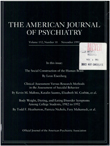The relationship between dementia and elder abuse
Abstract
OBJECTIVE: Alzheimer's disease and other dementias may be associated with greater risk for physical abuse than other illnesses of the elderly. The authors examined the relationship between dementia and abusive behavior in a group of demented patients and their caregivers. METHOD: An anonymous questionnaire was distributed to 1,000 caregivers who called a telephone help line specializing in dementia. Demographic characteristics of patients and caregivers were assessed, the occurrence of abuse was examined, and caregivers completed the Zarit Burden Interview and the Zung Self-Rating Depression Scale. RESULTS: Questionnaires were completed by 342 caregivers. The mean age of caregivers was 56.1 years; 163 (54.5%) were adult children caring for parents, 111 (37.1%) cared for spouses, and 25 (8.4%) cared for other relatives. Thirty-three caregivers (11.9%) reported that they had directed physically abusive behavior (e.g., pinching, shoving, biting, kicking, striking) toward the dementia patient in their care. These caregivers had been providing care for more years, cared for patients functioning at a lower level, displayed higher burden scores, and displayed higher depression scores than caregivers who reported no abuse. In addition, 92 caregivers (33.1%) reported that the patient directed abuse toward them during the course of providing care. Caregivers who had been abused by patients, in comparison to those who had not, were more likely to direct abusive behavior back toward the patient in their care. CONCLUSIONS: These results support the hypothesis that abuse involving cognitively impaired older adults and their caregivers may be associated with the relatively high psychological and physical demands placed on family members who care for relatives with dementia.
Access content
To read the fulltext, please use one of the options below to sign in or purchase access.- Personal login
- Institutional Login
- Sign in via OpenAthens
- Register for access
-
Please login/register if you wish to pair your device and check access availability.
Not a subscriber?
PsychiatryOnline subscription options offer access to the DSM-5 library, books, journals, CME, and patient resources. This all-in-one virtual library provides psychiatrists and mental health professionals with key resources for diagnosis, treatment, research, and professional development.
Need more help? PsychiatryOnline Customer Service may be reached by emailing [email protected] or by calling 800-368-5777 (in the U.S.) or 703-907-7322 (outside the U.S.).



